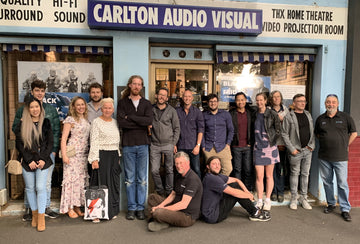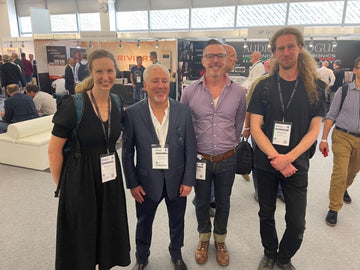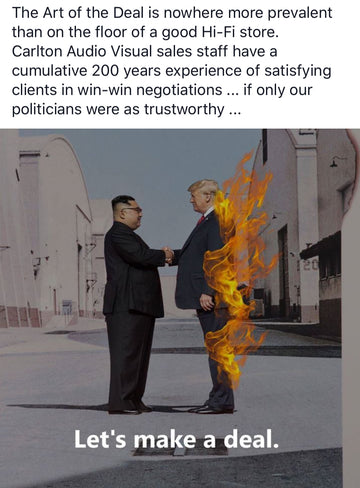Equally as interesting to me as a Hi-Fi show, is the opportunity to encounter those bedfellows who form the bedrock of the Australian consumer electronics purveyance scene. Kogan has undergone a ballistic trajectory within the confined spaces of the local marketplace and is now fronting as a real player in the major retail space without having a single bricks and mortar premise.
So when an opportunity came up to hear their most recent partner David Shafer give a breakfast talk I was eager to attend.
I am aware that our website is visited by other specialist industry workers whom I expect will also be interested in what David had to say. Plus those of our clients who follow our site are usually of that industry knowledge level to be interested in such things. Thus a minor synopsis of David’s talk that morning follows:
Kogan Electronics has risen since its inception in 2006 to become the number one Australian online retailer by brand traffic. David joined the company in 2010 with three basic principles for a business:
Understand the opportunity.
Exploit the opportunity.
Stand for something …
The onset of the internet offers a spectrum of challenges and opportunities not seen since the industrial revolution. Retailing used to be strictly a largely locally geographic based concern. The internet as a new medium of distribution offers brand owners the opportunity to sell direct to end users and control the customer experience with a full stack of retail purveyance.
When David joined Kogan as a partner in 2010 he was aware that the incumbents in Australia were not responding to the opportunity … incidentally David was 26 and single when he joined and left a secure career path with a mainstream legal practice to take up the role alongside his old school friend Ruslan. He makes the point that if he were to be offered the same opportunity now with the triple responsibilities of spouse, children, and mortgage; it’s very unlikely that he would leave that career security zone and adopt the entrepreneurial path were he to be offered the opportunity again now.
Uber ... the worlds number one taxi service ... owns no vehicles
Air BnB ... the worlds largest accommodation service ... owns no real estate
Ali Baba ... the worlds largest retailer ... has no inventory
The value is created by the platform ...
When David joined Kogan they firstly questioned their real competitive advantage.
At the time they had just ten products and were a self-described “manufacturer”. Although they made this claim the reality was that they were a vertically integrated online retailer with a private label. Once they “owned up” to this internally it opened up the opportunity.
In 2011 Kogan started retailing other brands. They had observed the huge price difference between Australia and overseas in particular market categories.
Indeed David typified the situation by pointing out that back in the day when Australians came back from visiting Hong Kong or Singapore people would invariably not ask them “What did you do?’ but rather “What did you buy?” ...
Out of house label brand sales rapidly became 60 - 70% of their business.
They had found it lucrative to engineer the supply chain of third party suppliers without having to expose themselves to the normally associated costs of inventory. Turnover rapidly climbed to $100m ...
Their private label business also grew as an accessory offering to the new brands … a Kogan case for the new smartphone ...
As David iterates ... “It’s not the strongest or the most intelligent that survive, it’s the most adaptable”.
Kogan has been very quick to adapt to new opportunities. Their turnover is now $250m ...
There is a saying they promulgate within Kogan: “There is always a better way”.
They encourage employees to challenge management. Emails are “Reply all” to allow all level intercourse amidst the 200 employees. Some of the lowest employees are the most productive. All who work there have a mandate to look for exploitable benefits of the online process.
The ability to effectively remarket to their consumers for free is a powerful tool in their repertoire … when you buy from Kogan you are then sent emails for free … the remarketing expense is very low.
Things have moved on in the online purveyance environment . If you start a new business now you will only get visitors to your site if you pay. In fact a business can only be profitable if it gets the maximum percentage of of traffic for free.
These days Kogan can tailor its email and website to an individuals profiled preference, The product recommendations are engineered from the prior history of the clients visits and the shopping experience is actually individually created for a particular customer.
Amazon of course are one of the most successful profilers and now know better than we ourselves do what we may want to buy via their effective learning algorithms and website smarts.
The cashflow cycle of an online business can be a great advantage. In a physical store the cashflow costs are priced into the product on the shelf.
By comparison an online business has the ability to potentially sell their private label products as pre sales without actually having yet acquired the inventory. Plus they are able to sell products direct from the overseas suppliers without having to finance the inventory. Then there is the sub $1000 GST exemption that they also leverage on the imported products …
If the purveyed product is a third party brand of postal size Kogan have demonstrated it is possible to ship something in from overseas to a client faster than JB or Harvey Norman are capable of doing within Australia. Typically they found that they could ship from Hong Kong in three days whereas JB would take five to seven working days within Australia.
David was very specific that a business should stand for something, “you need to understand what your company stands for in business both for your customers and your suppliers”.
He bought up the example of Pioneer and Sharp in Australia, both manufacturers of excellent product that were unable to make a profit with their televisions. No one knew what they stood for as a brand.
Kogan’s mission is “Price leadership through online efficiency”.
Aldi is “Price leadership through private labels”.
Costco is “Price leadership through warehouse purveyance”.
Kogan leverages every advantage of the online purveyance medium ...
David is by no means saying that online spells the end of bricks and mortar stores, but that they must change. In fact the flagship stores of brands such as Apple et al are now being used to control the consumer experience and are part of the shift from intermediary to direct retailing. The Apple flagship store in New York does twice the sales per square foot of any other US retailer.
Several times David referred to Lululemon as an icon of internet resellers, fortunately he appears to share none of the weird aspects of that very unusual brands Ayn Rand driven philosophies …
In 2014 Kogan started branching out beyond CE into new verticals; power tools and camping being two prime examples that are a really rich high margin territory. The comment was made that consumer electronics now represent the lowest margin return of any category.
In their in house brand they are following the path of Costco with its Kirkland brand and are also appear to have under consideration the Aldi model of a new brand for each vertical category. It is of note that Woolworths of South Africa has just purchased David Jones here in Australia with the explicit business plan to sell private labels.
This year “Kogan Pantry” has opened with 6-800 non-perishable lines of foodstuff specifically to undercut Coles. Next we have “Kogan Travel” that David describes as an ideal operating medium for their online offering. Traverl is apparently the largest category in E Commenrce and the perfect thing to sell online using the Kogan structural advantage. They are aiming to offer travel deals with premium tour providers on the principle that the consumer knows good from bad and that you must not try to outsmart your customers.
Kogan have carefully quality valuated their own private label brand, so Televisions are no longer from this week’s spare container but are actually made under the auspices of the Toshiba company. Likewise their third party brand offerings are tier one and two products with high recognition.
They are not interested in selling tables for example, their product must be compact and packaged to travel but they will sell the cups and saucers.
Kogan has been accused of disruption by the incumbents, Harvey Norman in particular have targeted them in press releases, but David is adamant that they do not set out to disrupt; and indeed, were someone to have a business model with apple cart turning as their primary aim they wouldn’t be around for long. He quoted the example of Netflix that started out shipping DVDs by post and adapted to the online environment to the extent that it is now a valid threat to cable TV.
Kogan is in a fierce state of competition and in fact David used the term “trench warfare” to coin their relationship with Harveys and JBs … Five years ago Harvey Norman didn’t even have an online presence. The current bricks and mortar catch phrase is “omnichannel” and he was highly dismissive of this concept.
Every bricks and mortar business is faced with a pricing problem: If they price low to compete online they will cannibalize their own normal retail trade, if they price high they won’t be competitive.
Harvey Norman have complained bitterly about the GST threshold that Kogan exploit and it is interesting that Mr Hockey has announced that this government will now regulate this. Although they have not said exactly how they intend to regulate ...
Kogan thinks of Harvey Norman and the other incumbents as being old and stately ocean liners while they are the speedboats that run rings around them. Currently Kogan employs 200 people and this October will be unveiling an as yet undisclosed new offering in a market space currently occupied by lazy incumbents. We watch with interest.





